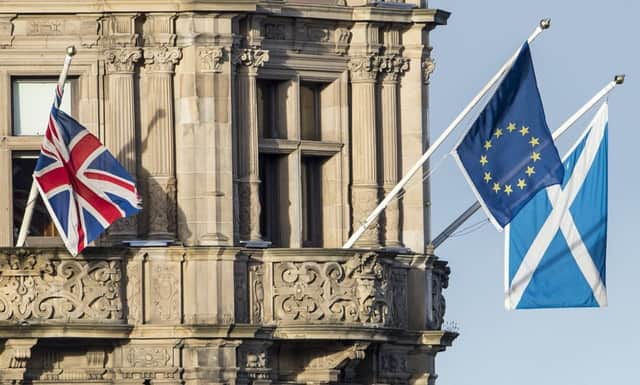Rachel Ormston: Is Scotland a nation of Europhiles?


With a referendum on Britain’s future in the EU due at some point before the end of 2017, the extent to which this belief is accurate and what it might mean for Scotland-rUK relations has become yet another touchstone in the debate over our constitutional future.
Nicola Sturgeon has recently stated that if Scotland were taken out of the EU against the “democratically expressed wishes” of its people, a second referendum on Scottish independence would be “probably unstoppable”.
But how Europhile are we really?
Advertisement
Hide AdAdvertisement
Hide AdThere are at least two parts to the answer to this question.
First, in a political sense, we do appear to be a little more pro-EU than people in the rest of the UK. ScotCen’s Scottish Social Attitudes survey has long shown that, when asked to choose which of a range of options for Britain’s relationship with the EU they prefer, fewer people in Scotland think we should leave the EU altogether – just 17 per cent in 2014, compared with 26 per cent of people across Britain as a whole (based on the British Social Attitudes survey).
Only two polls to date (from Panelbase and Survation) have asked large samples of people in Scotland how they plan to vote in the referendum, but both put support for the UK remaining in the EU at over 60 per cent (after those who have not made up their mind are removed). This is higher than the 54 per cent of people across Britain as a whole who favour remaining in the EU, based on an average of the six most recent polls.
So while the evidence to date continues to point to a narrow victory for the remain campaign in Britain as a whole as well as in Scotland, the size of the gap between Scotland and the rest of the UK means that if there were a swing towards the ‘Leave’ camp, the scenario Sturgeon outlines could be a distinct possibility.
But what this data does not show is that our more favourable stance on the EU does not have its roots in any more emotional connection to our EU neighbours. In short, although we are willing to support the EU, this is not because we feel particularly ‘European’.
In fact, if anything, we are less likely to express a ‘European’ identity than are people in the rest of Britain. In 2014, just 9 per cent of people in Scotland chose ‘European’ from a list of various geographic or national identities that might describe them, compared with 15 per cent of people in Britain as a whole (source: Scottish/British Social Attitudes).
Unsurprisingly, ‘Scottish’ and/or ‘British’ are the most popular choices. Perhaps the debate about ‘Scottishness’ and ‘Britishness’ and the relationship between the two simply crowds out the possibility of feeling a third ‘supranational’ identity for many of us. Whatever the reason, it appears that Scots’ greater support for remaining in the EU is not based on ‘emotional’ identification with Europe.
In fact, our data suggests that pragmatic concerns, rather than issues of identity, will be key in the referendum debate as a whole. There is only a relatively weak link between feeling European or not and supporting or opposing the EU. But there is a much stronger connection between views on the impact of EU links on Britain’s economic performance and whether people want to continue or withdraw.
Advertisement
Hide AdAdvertisement
Hide AdPerhaps in Scotland these pragmatic considerations combine with more uniform support from our political leaders for staying in Europe to make us relatively more inclined to vote to remain. Although of course, as last year’s independence referendum taught us, a week is indeed a very long time in politics: at this stage, there is still much to play for.
Rachel Ormston is Head of Attitudes Research, ScotCen Social Research. Rachel also provides polling analysis for http://whatukthinks.org/eu an essential resource for poll watchers in the run up to the EU referendum.